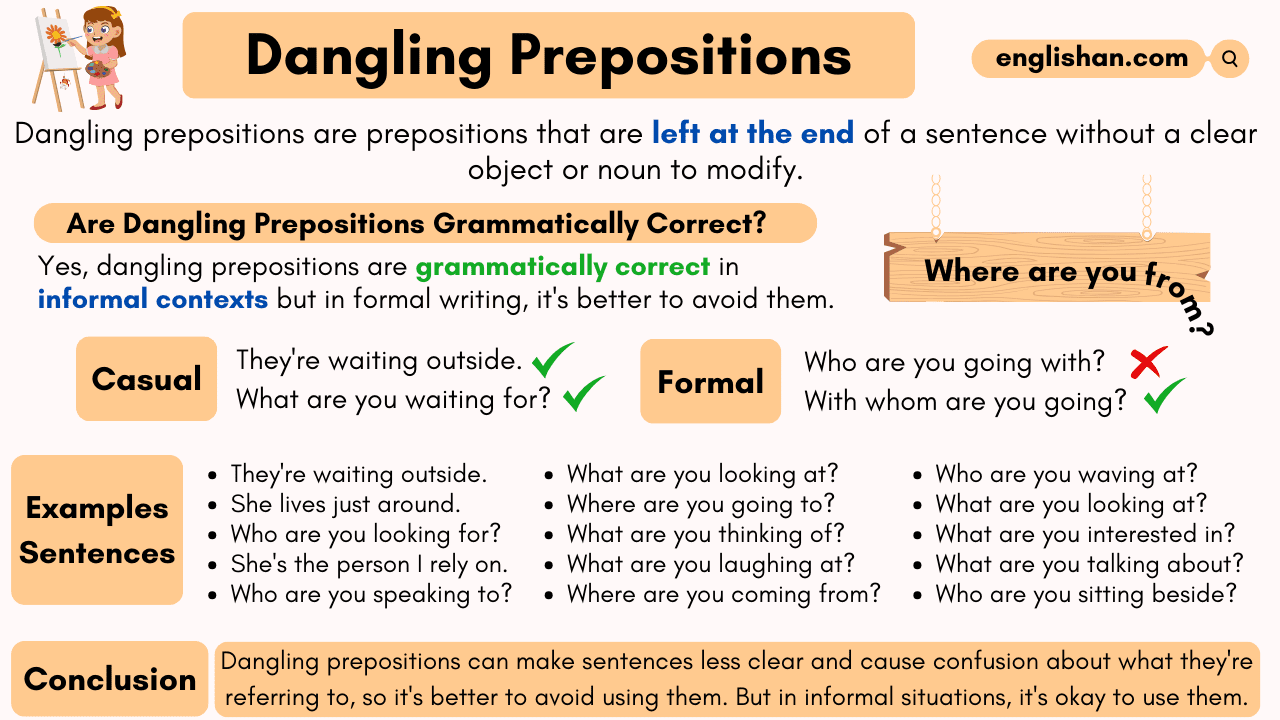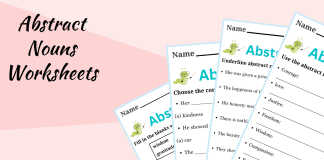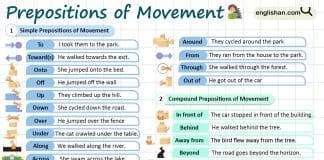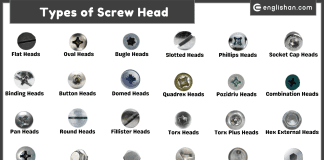Contents
Prepositions are important words that connect nouns or pronouns with other parts of a sentence. But sometimes, they can dangle in confusion when their object is missing or unclear. This article will explore the concept of dangling prepositions, their rules when to use them, whether they are grammatically correct, and when it’s acceptable to end a sentence with a preposition. Examples will be provided to make understanding this grammar concept easier. So let’s get started!
What Are Prepositions?
Prepositions are small words that show the relationship between nouns (people, places, or things) and other words in a sentence. They tell us where something is, when something happened, or how things are connected. Common ones include in, on, under, beside, between, and after. They add details about location, time, or direction. For example, in the sentence The cat is on the table, “on” preposition tells us where the cat is in relation to the table.
Understanding Dangling Prepositions
Improperly placed prepositions can make sentences confusing, especially when they’re left hanging without something to connect to. This often happens when the object of the preposition is missing or unclear.
What Are Dangling Prepositions?
Dangling prepositions are those that are left at the end of a sentence without a clear noun or pronoun to connect to. This makes the sentence unclear or awkward because the preposition doesn’t match up with the word it’s supposed to describe.
For example:
-
- She is afraid of.
- He talked about.
- What are you looking at?
Here of, about, and at are dangling prepositions because they’re not clearly connected to any noun or pronoun. This makes it hard to understand what the sentence is talking about.
Are Dangling Prepositions Grammatically Correct?
Dangling prepositions used to be considered grammatically incorrect, but in modern English, it’s perfectly acceptable and common to end sentences with prepositions. While they may make sentences less clear in some cases, they are often necessary for natural, idiomatic expression.
Sometimes ending a sentence with a preposition can make your meaning clearer and your sentences sound more natural. For instance:
- What are you interested in?
Dangling prepositions are commonly used in casual speech and informal writing.
- Example: Who are you talking to?
However, in more formal contexts such as academic writing or professional communication, it’s better to avoid them.
- Example: To whom are you speaking?
Avoiding dangling prepositions helps ensure that our writing is clear and easy to understand.
- Example: Where are you going?
This sentence, without the dangling preposition, is clearer and more direct.
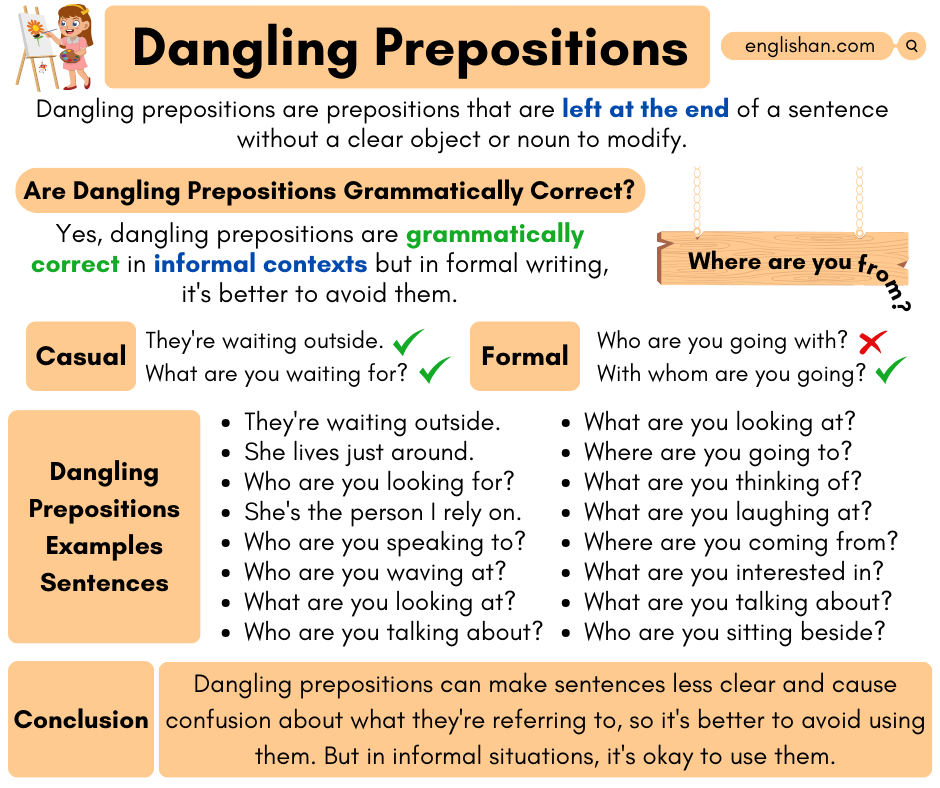
When to Use Dangling Prepositions?
In everyday speech, using dangling prepositions is totally fine and can make your sentences sound more relaxed and conversational. So, it’s okay to use them, especially when you’re speaking casually or writing informally. For example:
- What are you looking for?
- Where are you from?
- What are you talking about?
But, if you’re writing something like a school paper or a work report, it’s better to avoid ending sentences with prepositions. Instead, you might say: For what are you looking? or About what are you speaking? It sounds more formal.
Is it OK to End a Sentence with a Preposition?
Yes, it’s okay to end a sentence with a preposition! When you’re talking or writing casually, like with friends or family, it’s completely fine to end your sentences with prepositions. It’s natural and makes your sentences sound more like how people normally speak.
For example, saying What are you looking for? or Where are you from? is totally fine in casual conversations.
But if you’re writing something more formal, like for school or work, it’s often better to avoid ending sentences with prepositions. Instead, try to put the preposition before the word it connects to.
When It is Acceptable to Use Dangling Prepositions?
Using dangling prepositions is acceptable in everyday conversations, informal writing, and casual situations. It’s natural and how most people talk. So, when you’re chatting with friends, sending text messages, or writing in a relaxed style, feel free to use dangling prepositions. They make your sentences sound more friendly and conversational.
However, in formal writing, like academic papers, business reports, or professional emails, it’s better to avoid dangling prepositions. In these cases, it’s considered more proper to rephrase your sentences to place the preposition elsewhere or to use a different structure altogether.
Why Dangling Prepositions Are Considered Incorrect?
Dangling prepositions considered incorrect because:
- Traditional Rules: Grammar rules suggest not ending sentences with prepositions.
- Clarity: Ending with a preposition can sometimes make the meaning less clear.
- Formal Writing: In formal writing, like essays, it’s better to avoid dangling prepositions.
When It is Wrong to End a Sentence with a Preposition?
In formal English, like in school essays or professional writing, it’s considered wrong to end a sentence with a preposition. Instead, put the preposition before the word it connects to. This makes your writing clearer and more proper. However, in everyday talk, it’s okay to end with a preposition.
Dangling Prepositions Rules
- “Don’t end sentences with prepositions” was an old rule.
- But now, it’s okay and normal to end sentences with prepositions.
- It’s more important that your sentences sound natural and clear.
- People often use them in everyday conversation without noticing.
- Formal Writing Rule: In formal writing, avoid dangling prepositions.
- Middle and High School rules: Teachers often teach to avoid them.
- Connect to Noun: Prepositions must connect to a noun or pronoun.
- Use Before: Place prepositions before the noun or pronoun they relate to.
- Make Clear: Ensure the connection between preposition and noun is clear.
- Check Clarity: Ensure the sentence makes sense and is easy to understand.
Dangling Prepositions List
Here’s a list of some common prepositions that are often considered “dangling” when they’re at the end of a sentence:
- about
- after
- at
- before
- behind
- by
- for
- from
- in
- of
- on
- over
- through
- to
- under
- with
Dangling Prepositions Examples Sentences
- What are you looking at?
- Where are you going to?
- Who are you talking about?
- Who are you waiting for?
- What are you thinking of?
- What are you laughing at?
- Where are you from?
- What are you talking about?
- Where are you coming from?
- Who are you going with?
- They’re waiting outside.
- She lives just around.
- Who are you speaking to?
- Who are you looking for?
- What are you waiting for?
- Who are you running after?
- She’s the person I rely on.
- Who are you sitting beside?
- Who are you waving at?
- Which book are you interested in?
Dangling Prepositions Exercises
Fill in the blanks with the appropriate preposition to complete each sentence.
- Where are you __________?
- She is waiting __________.
- Where are you going __________?
- He is coming __________.
- The cat is hiding __________.
- Who are you looking __________?
- I am looking __________.
- Who are you waving __________?
- They are talking __________.
- He is sitting __________.
- Where are you coming __________?
- We are eating __________.
- What are you waiting __________?
- Who are you going __________?
- He is waiting __________.
Answer Key:
- from
- for
- to
- over
- under
- for
- for
- at
- about
- on
- from
- at
- with
- with
- outside
FAQs
Q1. What are dangling prepositions?
Dangling prepositions are prepositions that occur at the end of sentences. They’re commonly used in casual speech and informal writing but are generally avoided in formal writing.
Q2. When to Use Dangling Prepositions?
Dangling prepositions are used in casual conversations, informal writing, and everyday speech. They make sentences flow smoothly and are commonly used when we’re talking with friends or family.
Q3. Why is it wrong to have a dangling preposition?
It’s not always wrong, but in formal writing, it’s considered incorrect because it can make a sentence unclear or awkward. It’s better to put the preposition next to the word or phrase it belongs to.
Q4. Is it OK to End a Sentence with a Preposition?
Yes, it’s generally okay to end a sentence with a preposition, especially in spoken English or informal writing. Ending a sentence with a preposition can sometimes make your sentences sound more natural and conversational.
You May Also Like
